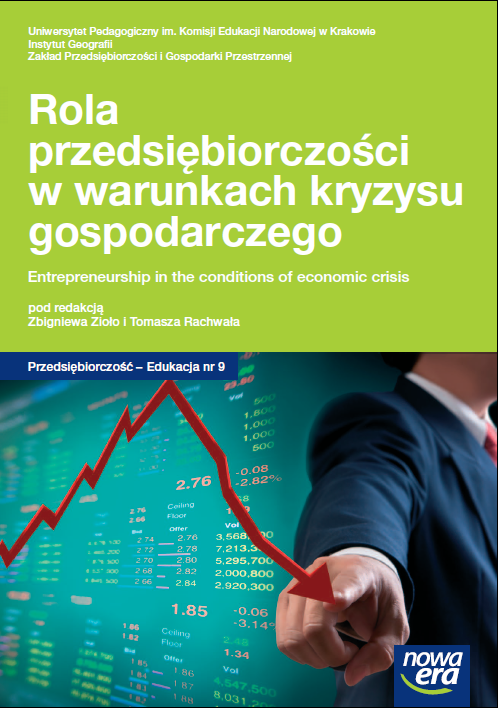The functioning of selected public institutions for supporting entrepreneurship during an economic crisis in Poland
DOI:
https://doi.org/10.24917/20833296.9.5Keywords:
economic crisis, public support for entrepreneurship, employment agency, PARPAbstract
The most distinct and painful effect of the present economic crisis for the Polish society is the increasing unemployment, which causes negative consequences, not only economic, but above all - social. One of the ways to fight of economic recession and the decline in employment is encouraging and supporting entrepreneurship. Development of entrepreneurship seems to be the best way to fight unemployment, because it does not focus on mitigating its effects, but concentrates on defeating its direct cause. Entrepreneurship in times of crisis should concentrate on three areas of the economy: promotion of entrepreneurial attitudes among young people, development of innovation in enterprises (escape "forward") and stimulation of self-employment. In this article, the authors focus on that last way of reducing the rate of unemployment in Poland - stimulation of entrepreneurship, so as to create new businesses. In the analysis, the actions of selected public institutions, which assist individuals wishing to set up and run their own business, are presented. By outlining the activities of various institutions, authors demonstrate the possibilities which potential entrepreneurs can take advantage of. Among other types of support, the article de scribes the size and quantity of grants for setting up a business, and the effectiveness of this form of assistance, also in the opinion of new entrepreneurs.
References
Batorska, U. (2005). Rodzaje i struktura bezrobocia w Polsce. Przedsiębiorczość – Edukacja, 1, 239-250.
Berger, S., Canning, R., Dolan, M., Kurek, S., Pilz, M. & Rachwał, T. (2012). Curriculum-making in pre-vocational education in the lower secondary school: A regional comparative analysis within Europe. Journal of Curriculum Studies, 44(5), 679-701.
Dąbrowski, K. (2010). Przedsiębiorczość i edukacja jako strategie profesjonalistów na czas kryzysu. Przedsiębiorczość – Edukacja, 6, 493-498.
Dorocki, S. (2011). Wpływ kryzysu gospodarczego na przemiany struktur regionalnych Francji. Prace Komisji Geografii Przemysłu Polskiego Towarzystwa Geograficznego, 17, 67-86.
Dziewulski, J. (2009). Liberalizm i keynesizm wobec kryzysu. Studia Ekonomiczne, 9, 2 (42), 25-50.
Kurek, S., Rachwał, T. (2011). Development of entrepreneurship in ageing populations of The European Union. Procedia – Social and Behavioral Sciences, 19, 397-405.
Makieła, Z. (2007). Przedsiębiorczość w Polsce w układzie regionalnym. Przedsiębiorczość – Edukacja, 3, 18-23.
Orłowski, W., Pasternak, R., Flaht, K. & Szubert, D. (2010). Procesy inwestycyjne i strategie przedsiębiorstw w czasach kryzysu. Warszawa: Polska Agencja Rozwoju Przedsiębiorczości.
Osuch, W., Dwojak, A. (2009). Wspieranie przedsiębiorczości przez przeciwdziałanie marginalizacji społeczno-ekonomicznej grup nieprzystosowanych do konkurencji w gospodarce rynkowej jako dążenie do zrównoważonego rozwoju społeczeństwa informacyjnego (na przykładzie mniejszości ...). Przedsiębiorczość – Edukacja, 5, 244-253.
Piróg, D. (2012). Aspiracje i plany zawodowe młodzieży akademickiej w Polsce na przykładzie studentów geografii. W: A. Dudak, K. Klimkowska & A. Różański (red.), Przygotowanie zawodowe młodych pedagogów. Kraków: Oficyna Wydawnicza „Impuls”, 125-144.
Rachwał, T., (2010). Chapter 9. Entrepreneurship Education as a Growth Stimulus for Family Firms. W: A. Surdej, K. Wach (eds), Exploring the Dynamics of Entrepreneurship, Toruń: A. Marszałek Publishing House, 139-156.
Badanie ogólnopolskie nt. stosowanej formy aktywizacji zawodowej bezrobotnych jaką jest przyznawanie środków Funduszu Pracy na podjęcie działalności gospodarczej (2011). Raport MPiPS. Gdańsk: EU-Consult Sp. z o.o.
Wach K., 2005, Współpraca małych i średnich przedsiębiorstw z ośrodkami naukowo-badawczymi na przykładzie Krakowskiego Parku Technologicznego. Zeszyty Naukowe Akademii Ekonomicznej w Krakowie, No. 671, s. 117-133.
Zioło, Z. (2007). Rola przedsiębiorczości w aktywizacji gospodarczej – zarys modelu. Przedsiębiorczość – Edukacja, 3, 10-17.
Downloads
Published
How to Cite
Issue
Section
License
Articles are published under the terms of the Creative Commons License (CC BY-ND 4.0; Attribution– NoDerivs).

